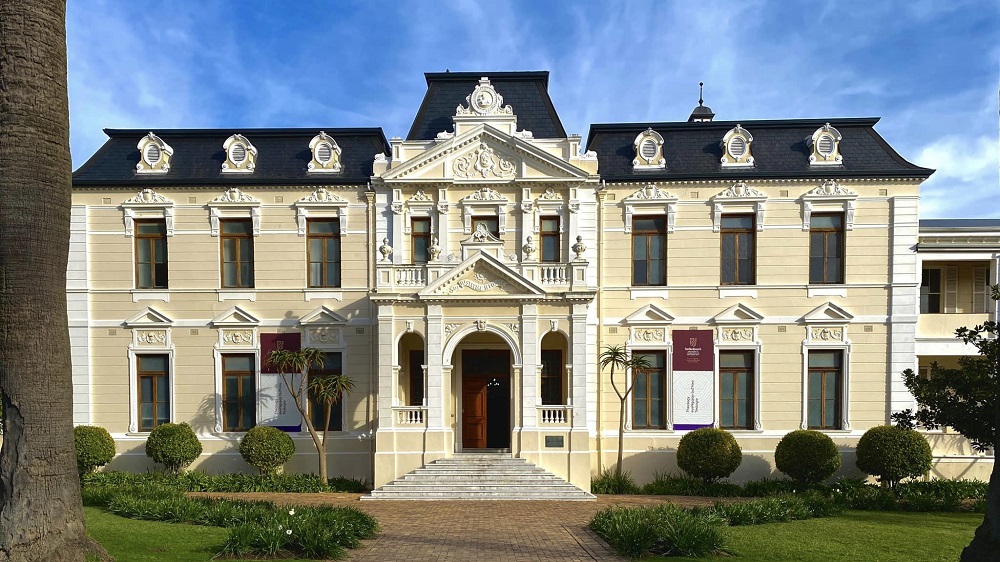Theology
IFakhalthi yezeNkolo

The Faculty of Theology at Stellenbosch University is an ecumenical faculty which provides academic training in Christian theology according to different confessional convictions and church traditions. The Faculty of Theology (established in 1963) developed out of the Theological Seminary of the Dutch Reformed Church (DRC), which was founded in 1859. It is an open faculty which also trains ministers, per agreement, for the following denominations:
- Dutch Reformed Church (DRC)
- Uniting Reformed Church in Southern Africa (URCSA)
- Uniting Presbyterian Church in Southern Africa (UPCSA)
- Anglican Church of Southern Africa (ACSA)
- Volkskerk
- United Evangelical Lutheran Church in Southern Africa (UELCSA)
The Faculty of Theology, one of the smallest faculties at the University, is a hospitable, energetic and creative faculty in which scientific theology is practised with integrity.
The academic offering, with Christian Reformed theology as point of departure, was broadened with the incorporation of a Youth Work programme and the development of a new curriculum which offers a wide range of options for undergraduate students regarding teaching and research. The undergraduate and postgraduate programmes of the Faculty accommodates students from various communities, churches and countries.

empty
empty tag
What careers can I follow if I study theology?
Theology can open many pathways. While most people are aware that a degree from the Faculty of Theology can prepare you for church ministry, it actually opens up a multitude of other directions too. Alumni of the faculty also follow careers in youth work, community development, pastoral care, academia, education, law, entertainment, and relief work. Many alumni have become leaders in other fields like politics and the public arena. This faculty prepares you for a life of contributing to society and the greater good, by giving you a scientific theological grounding, understanding of and skills for dealing with societal ills, and an ethical compass.
What undergraduate programmes do you offer?
We offer four undergraduate programmes. The four-year BDiv programme (typically for prospective ministry candidates), and the three-year BTh programme with a general or Youth Work focus are for full-time residential students who attend classes on campus. The BTh (Part-time) is a four year programme presented in block contact sessions and online for older (mostly working) students. See our undergraduate prospectus for more information.
Will I have to do Greek and Hebrew?
The original languages are only compulsory for students doing the BDiv programme with a view to ministry in certain churches. For all the other programmes, it is optional.
What subjects will I be doing?
All students get a basic grounding in the six theological disciplines: Old and New Testament, Systematic Theology (ethics and doctrine, that is what people believe and the implications of those beliefs – this would, for instance, include public theology), Practical Theology (the applications of theology, including congregational work, youth work, community development, pastoral care – this would also include, for instance, dealing with the effects of poverty, gangsterism and substance abuse), Church history and church polity (church “law”), and Missiology (interreligious and intercultural competence). For some programmes, modules from the Faculty for Arts and Social Sciences are compulsory or elective, for example Psychology, Sociology, Greek and Hebrew and isiXhosa.
What kind of student experience does the faculty offer?
The Faculty of Theology is one of the smallest but most diverse faculties on campus, offering a unique student experience. This allows for robust student interaction, opportunities to discover and learn to appreciate the wealth of experience and insights students and staff bring to our faculty, and developing the skills to contribute to ongoing conversation on our campus and in our country in an informed and constructive manner. And of course, we have a beautiful building and grounds and a fascinating history!
Can I get funding?
The faculty does not offer bursaries, all students need to apply to the Undergraduate Bursary Office. You can do so by following the link on the webpage for Prospective Students. Please note that the applications for bursaries in the following year, close early – be sure to get your application in as soon as possible.
What support does the faculty offer new students?
The faculty offers a wide spectrum of academic and wellness support. The first-year coordinator, Dr Dawid Mouton, focuses on supporting first years, particularly academically. Mentors and tutors are also available for academic support. The Theological Student Committee offers peer support on all levels. And the faculty makes use of campus support services where necessary. Students in any form of distress or need, are welcome to use the dean’s office as a first point of reference (mariekeb@sun.ac.za).
